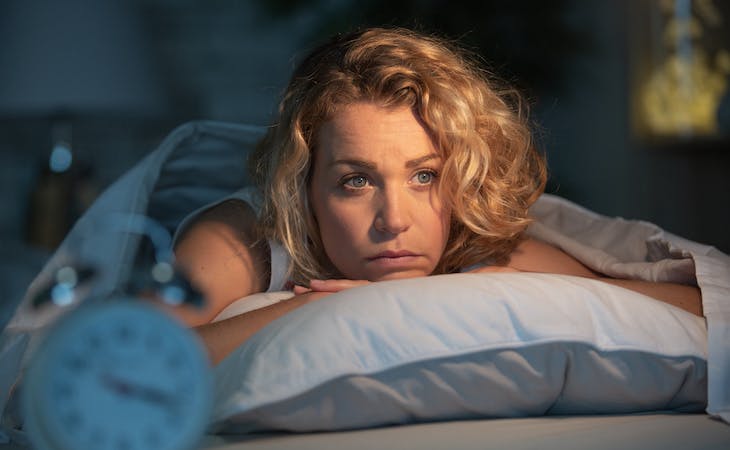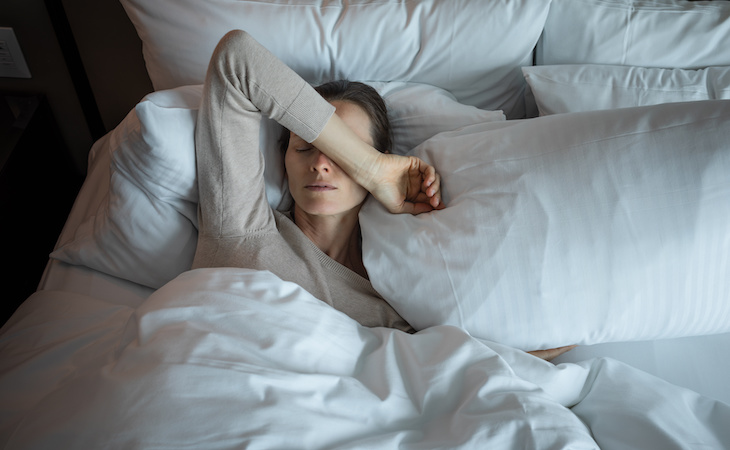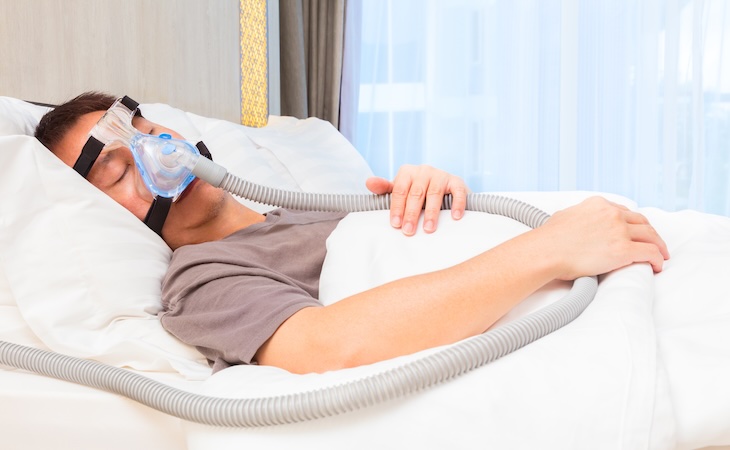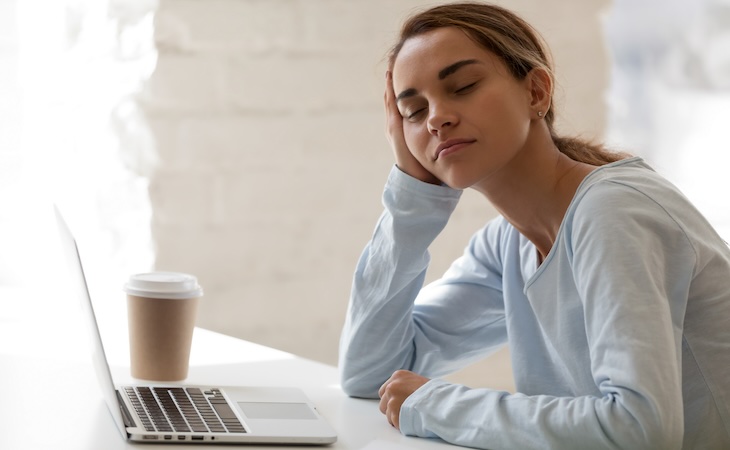Have you ever woken abruptly with a jerk or falling sensation? There’s a name for that: hypnic jerks.
Hypnic jerks can be unpleasant and even a bit alarming. If you’re ever concerned about the severity or frequency of hypnic jerks, don’t hesitate to discuss it with your doctor.
The good news is they’re usually a harmless, normal part of falling asleep. [1] Only in rare cases do hypnic jerks lead to bigger issues such as injury or insomnia. [1, 10]
We talked to sleep experts to find out everything you need to know about hypnic jerks, including what causes them and how to prevent them.
What is a hypnic jerk?
“Hypnic jerks, also known as sleep starts, are brief muscle contractions that occur at sleep onset,” says Stephanie Stahl, MD, sleep medicine physician at Indiana University Health.
For up to 70% of people, hypnic jerks are a part of everyday life. [2] These involuntary muscle contractions can happen to adults of all ages and health levels.
What does a hypnic jerk feel like?
Hypnic jerks vary in severity and frequency. You might feel a fast jerking motion, a series of involuntary twitches, or even a stomach-churching falling sensation.
Sometimes your hypnic jerks wake you up—and sometimes they wake your bed partner instead. [10] Because some hypnic jerks are only minor twitches, you might not rouse enough to know you’re experiencing them.
Hypnic jerks can also be multisensory. [3] Stahl says some people think they heard a loud bang or saw flashing lights. “Some people may have multiple jerks or even cry out,” she adds.
What causes hypnic jerks?
It’s difficult to pinpoint the exact cause of hypnic jerks. Experts are still uncertain how to explain or predict them. Stahl says disruptions to your sleep-to-wake transition might contribute.
Here are some potential causes of hypnic jerks: [1]
- Excessive caffeine or nicotine: These common stimulants interfere with sleep by boosting alertness. [4] Feeling restless or twitchy because of excessive caffeine or nicotine might increase your chance of experiencing hypnic jerks.
- Insufficient sleep: Research from 2023 found that hypnic jerks can be triggered by fatigue or sleep deprivation. [1]
- Sleep apnea: This condition causes you to briefly stop breathing. [5] The pauses or sudden restarts of airflow might trigger hypnic jerks. [6]
- Intense physical exercise: Working out just before bedtime can lead to restlessness, potentially contributing to hypnic jerks. [7]
- Emotional stress: You might experience more hypnic jerks when stressed or anxious, according to Stahl. Research suggests high cortisol (commonly called the “stress hormone”) disrupts your body’s natural sleep-wake schedule. [8]
Who gets hypnic jerks?
While hypnic jerks are widespread and considered common for all ages, some people may be more prone to experiencing them than others. [1]
According to Andrew Colsky, licensed mental health counselor, sleep science expert, radio host of Sleep Science Today, and founder of the National Sleep Center, you may be more prone to hypnic jerks if:
- You’re under a lot of stress
- You drink a lot of caffeine
- You have an inconsistent sleep schedule
- You have a sleep disorder
- You don’t get enough sleep
- You use screens from bed
- You have a lot of anxiety
Pregnant people may also be more prone to hypnic jerks. Pregnancy doesn’t cause hypnic jerks, but it can make you more likely to experience Restless Legs Syndrome (RLS)—and one of the symptoms of RLS can be hypnic jerks. [9]
Are hypnic jerks dangerous?
Hypnic jerks alone aren’t considered dangerous. However, a hypnic jerk can make you accidentally kick your bed partner or stub your toe on the footboard. Frequent hypnic jerks might also trigger stress or anxiety about falling asleep, leading to restlessness and insomnia. [10]
True hypnic jerks occur only during the transition between waking and sleeping. [1] Consult a medical professional if you start experiencing sudden involuntary muscle contractions (myoclonus) during the day. [11]
Myoclonus can sometimes indicate an underlying neurological condition or adverse reaction to a medication. [12] (Learn the science behind yawning.)
How to stop hypnic jerks
Because hypnic jerks aren’t dangerous, there’s no medical reason to try to prevent them. And because the cause of hypnic jerks is still unknown, there’s no surefire prevention method.
That said, maintaining a consistent sleep schedule might reduce the frequency of these sleep starts, says Stahl. Here are some other tips to help prevent startling yourself awake while falling asleep: [10]
- Reduce caffeine intake. Since caffeine might contribute to hypnic jerks, try lowering the amount of coffee, tea, and chocolate you consume—especially in the late afternoons and evenings.
- Stop nicotine use. Nicotine is a stimulant, so it might increase the likelihood of hypnic jerks.
- Manage stress levels. “Work on stress reduction,” suggests Stahl. In addition to possibly preventing hypnic jerks, lower stress levels can improve your overall sleep quality.
- Go to bed on time. A regular-sleep wake schedule is vital to a smooth transition to dreamland. “Obtain adequate sleep, which is at least seven hours for adults,” says Stahl.
- Get help for anxiety. Research suggests emotional stress can increase your chance of experiencing hypnic jerks. [3] Addressing your anxiety can help calm your mind and help you transition more smoothly between sleeping and waking.
When to see a doctor
In general, hypnic jerks are harmless—but there are some cases that may warrant a check with your doctor.
“If you experience hypnic jerks on a nightly basis and they disrupt your ability to fall asleep or enter into a deeper stage of sleep, then it can’t hurt to check with your doctor,” says Colsky.
There are a few actual sleep disorders that have elements similar to hypnic jerks. These sleep disorders can have long-lasting health consequences, which is why it’s important to get a proper diagnosis.
One such example is RLS. [13] “(RLS) is an uncontrolled desire to move your legs usually in the evening but while you are still awake,” says Colsky. “RLS may be linked to an iron deficiency or an imbalance of dopamine.”
Another example is Periodic Limb Movement Disorder (PLMD). [13] “It usually affects lower limbs and occurs every 20-40 seconds,” says Colsky. [14] “Since PLMD happens after you have fallen asleep, you usually do not know it is happening unless a bed partner tells you or if it is discovered during a sleep study.”
Sleep apnea, a sleep breathing disorder, can cause you to twitch and gasp for air in your sleep. Your reactions can feel like hypnic jerks, says Colsky. [6]
Finally, myoclonic seizures from epilepsy can cause twitching that isn’t associated with sleep transitions, says Colsky. [13]
“Additionally, if you experience other disorders along with twitching in your limbs like other neurological symptoms, if you are taking an SSRI or SNRI or meds for ADHD, or if you suspect that you have an additional sleep disorder, you should speak with your doctor,” notes Colsky. [13]
FAQs
What are the symptoms of hypnic jerks?
The symptoms of hypnic jerks include involuntary muscle twitches or clenching. Some hypnic jerks are also accompanied by a falling sensation, visualization of flashing lights, or auditory hallucination similar to a loud bang.
Is a hypnic jerk a disorder?
Hypnic jerks alone don’t indicate a medical disorder. They aren’t considered dangerous or alarming. In fact, about 70% of adults experience sleep starts.
Is a hypnic jerk anxiety?
Hypnic jerks might be exacerbated by anxiety, but experiencing a hypnic jerk doesn’t necessarily mean you have anxiety. “Anxiety and stress are potential causes of hypnic jerks,” explains Stahl.
Sleep talking is another phenomenon that’s fairly common. Learn more about what causes sleep talking and how to stop doing it.
References
- Alghamdi, S. A. (2023). Hypnic Jerks, Major Depressive Disorder, and Antidepressant Use: A Possible Relationship. Cureus, 15(10), e47436. https://doi.org/10.7759/cureus.47436
- Frenette, E., & Guilleminault, C. (2013). Nonepileptic paroxysmal sleep disorders. Handbook of Clinical Neurology, 112, 857-860. https://doi.org/10.1016/B978-0-444-52910-7.00006-4
- Sathe, H., Karia, S., Desousa, A., & Shah, N. (2015). Hypnic jerks possibly induced by escitalopram. Journal of neurosciences in rural practice, 6(3), 423–424. https://doi.org/10.4103/0976-3147.158797
- Ogeil, R. P., & Phillips, J. G. (2015). Commonly used stimulants: Sleep problems, dependence and psychological distress. Drug and alcohol dependence, 153, 145–151. https://doi.org/10.1016/j.drugalcdep.2015.05.036
- National Heart, Lung, and Blood Institute. What Is Sleep Apnea? https://www.nhlbi.nih.gov/health/sleep-apnea
- Okura, M., Tanaka, M., Sugita, H., Taniguchi, M., & Ohi, M. (2012). Obstructive sleep apnea syndrome aggravated propriospinal myoclonus at sleep onset. Sleep Medicine, 13(1), 111-114. https://doi.org/10.1016/j.sleep.2011.06.012
- Wasserman, D., Duncan, I., & Gnoni, V. (2020). Atypical nocturnal myoclonic jerks associated with increased physical activity. Sleep Medicine, 75, 128-130. https://doi.org/10.1016/j.sleep.2020.08.007
- Pulopulos, M. M., Hidalgo, V., Puig-Perez, S., Montoliu, T., & Salvador, A. (2020). Relationship between Cortisol Changes during the Night and Subjective and Objective Sleep Quality in Healthy Older People. International Journal of Environmental Research and Public Health, 17(4), 1264. https://doi.org/10.3390/ijerph17041264
- Grover, A., & Clark-Bilodeau, C. (2015). Restless leg syndrome in pregnancy. Obstetric Medicine, 8(3), 121. https://doi.org/10.1177/1753495X15587452
- American Academy of Sleep Medicine. Sleep starts. https://sleepeducation.org/sleep-disorders/sleep-starts/
- Baylor College of Medicine. Myoclonus. https://sleepeducation.org/sleep-disorders/sleep-starts/
- Mayo Clinic. Myoclonus. https://www.mayoclinic.org/diseases-conditions/myoclonus/symptoms-causes/syc-20350459
- Kumar, Rakesh; Ali, Syed Naiyer; Saha, Shatabdi; Bhattacharjee, Subir. SSRI induced hypnic jerks: A case series. Indian Journal of Psychiatry 65(7):p 785-788, July 2023. DOI: 10.4103/indianjpsychiatry.indianjpsychiatry_207_23
- Merck Manual. Periodic Limb Movement Disorder (PLMD) and Restless Legs Syndrome (RLS). https://www.merckmanuals.com/professional/neurologic-disorders/sleep-and-wakefulness-disorders/periodic-limb-movement-disorder-plmd-and-restless-legs-syndrome-rls






